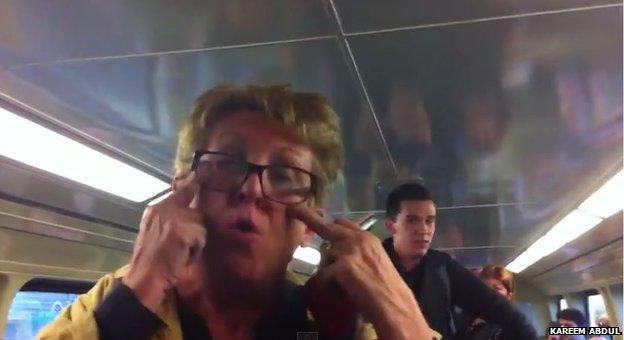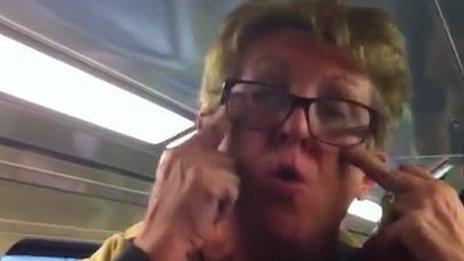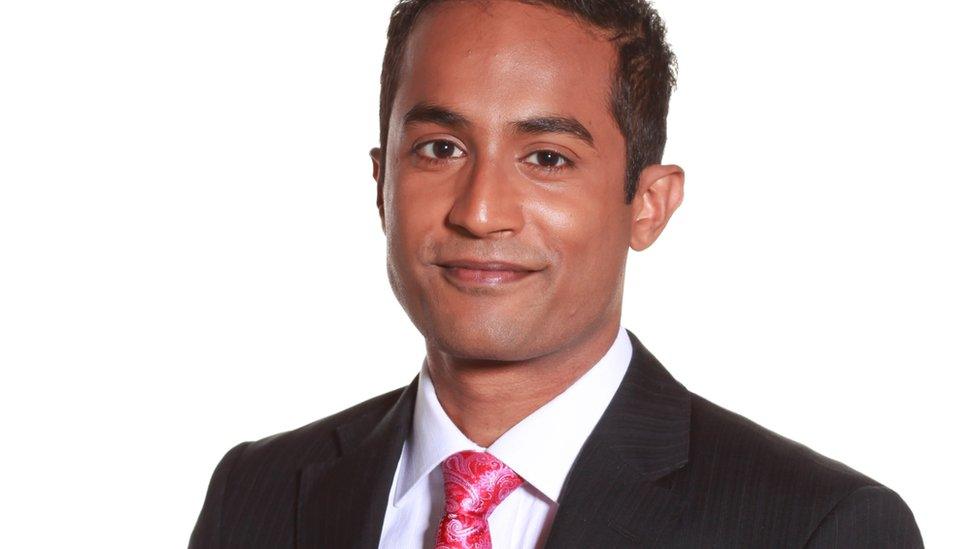Australia train rant: Is racism getting worse?
- Published

The woman who sparked the latest debate is now facing charges over her outburst
A middle-aged woman unloads a racist tirade at fellow passengers on a train in Australia's biggest city, and again the nation's attitude to racial diversity comes under scrutiny.
She taunts a man and, beside him, an Asian woman. The invective is caught on camera and posted online.
"Can't you get an Aussie girlfriend? You had to get a gook, you sad, poor pathetic man... Is it really that small you can't get an Aussie girl?" she said.
"What's wrong with Hong Kong? Why'd you come to this country? This is our country."
More than a quarter of Australians were born overseas. Theirs is a land that considers itself a multicultural success story, but it is one tainted by an indelible stain of bigotry.
"When you see someone really out of control letting fly with all those prejudices and hatreds it definitely is depressing," said Ramzi El Sayed, former president of the Islamic Council of Victoria.
"Racism in general will always be part of any society. It has always been the human problem."
'Small minority'
In 2009, a spate of vicious assaults on Indian students in Melbourne and Sydney triggered a diplomatic crisis. The attacks were blamed on racist thugs, although the police also suspected opportunistic muggers.
Last year, the decorated Aboriginal Australian Rules footballer Adam Goodes was called "an ape" by a 13-year old girl. Ironically, the match at the Melbourne Cricket Ground was part of the competition's Indigenous round that was supposed to celebrate the contribution of Aboriginal players.
Studies have shown that Mr Goodes is not alone. Angeline Ferdinand, a research fellow at the University of Melbourne, told the BBC that a staggering 97% of Aborigines she had surveyed had suffered racial discrimination in the past year.
"The most frequent forms of racism tend to be jokes and comments, stretching all the way to physical abuse and having property vandalised or destroyed," she said.
"Even as someone working in this area I was surprised at how common they were," the US-born academic added. "There is research in Australia to demonstrate that racism is increasing overall."
This is, though, a complex area of inquiry, where other academics believe that levels of intolerance in Australia are both stable and markedly less than other countries.
Andrew Markus, a professor at Monash University, has concluded that Australia has a bigoted core of about 10% of the population who view cultural diversity and minorities with disdain and suspicion.
Then there are those on the periphery who, Prof Markus says, tend "towards intolerant attitudes and that might be another 25% or a little bit more [of the population]".
"These are people who in certain circumstances may be attracted towards the politics of intolerance and bigotry," he says.
So although about a third of Australians might be prone to racism, Prof Markus argues that outbursts similar to the rant on that Sydney train are rare.
"People overseas may form the notion that that is typical of Australia, whereas I'd say it is typical of a very small minority. It is not indicative of Australian society," he says.
"But I don't want to suggest that everything here is wonderful because cultural diversity is always difficult for societies to manage."
'Like everywhere else'
Perhaps Australia's trump card against that hardcore of bigots is a general acceptance that this is a land built and constantly rejuvenated by immigration.
In the past, immigration from the UK and New Zealand dominated. Now it is immigration from China and India.
"Before coming to Australia I was a little worried about racism here because I know there were a cases of racism against Indians," says Ammar, a 26-year old student from Pakistan.
"But I went backpacking into Europe and met a lot of Aussies there. We had a good time and I totally got rid of that stereotype.
"You need to actually come here to see that there is minimal racism here. It is like everywhere else."
As for the woman on the train, she has been charged with using offensive language and will be forced to explain her actions in court later this month.
- Published4 July 2014

- Published16 February 2013
